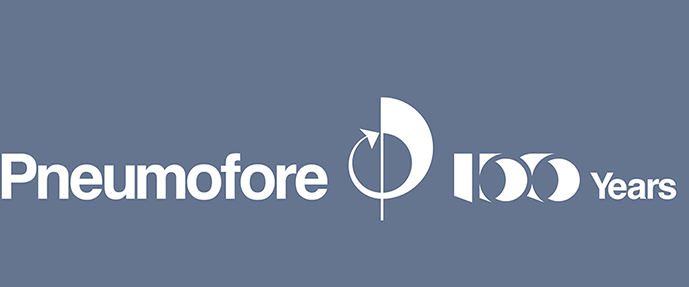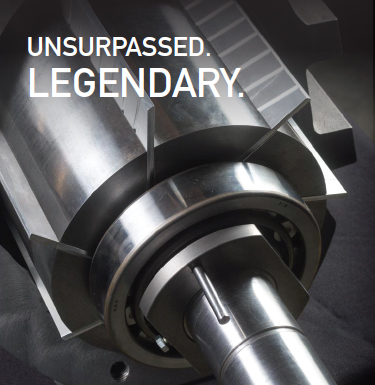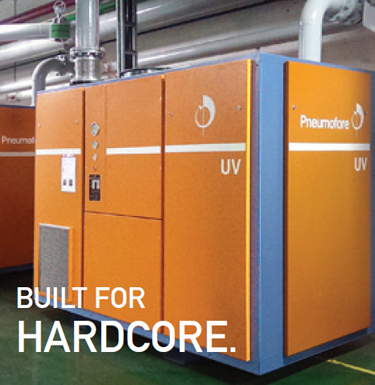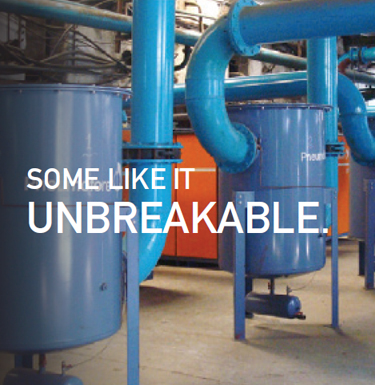Applications
Compressors can be used for a broad range of applications. Vacuum pumps are complex and frequently require specially designed solutions. Pneumofore specializes in designing and manufacturing high-efficiency compressor and vacuum systems tailored for various industries. Our expertise spans across:
[select an application below]
Can Making
The importance of vacuum and compressed air for beverage packaging and the aluminium can industry
 With over 90% of aluminium cans recycled, the metal beverage packaging and can making sectors are rapidly rising as the sustainable alternative to plastic manufacturing. In the transition toward a greener future, beverage cans made in aluminium are capturing growing market shares from plastic containers which are known for their low recycling rates and significant environmental pollution.
With over 90% of aluminium cans recycled, the metal beverage packaging and can making sectors are rapidly rising as the sustainable alternative to plastic manufacturing. In the transition toward a greener future, beverage cans made in aluminium are capturing growing market shares from plastic containers which are known for their low recycling rates and significant environmental pollution.
As consumer preferences shift towards eco-friendly options, aluminium cans emerge as the preferred choice due to their durability, recyclability, and ability to preserve the quality of the contents. Every aluminium can produced by the beverage packaging industry can be recycled indefinitely and may be reused without any limitation or loss in its intrinsic aluminium characteristics.
The growing demand for beverage packaging is driving innovation in the can making sector. The modern two-piece can industry produces on average over 3,000 aluminium cans per minute. In this fast and highly demanding manufacturing environment, unplanned machine downtimes must be avoided, making the selection of efficient pneumatic equipment crucial to maintain high production standards.
Without the supply of vacuum and compressed air, the can making process would halt. The production line in a can factory is a sequence, starting with aluminium coils at the entrance and ending with finished, printed and coated aluminium cans at the exit. Throughout this process, compressors and vacuum systems are essential in most manufacturing steps.
Over half of the electric energy consumption in a can plant is due to the continuous operation of vacuum pumps and air compressors. Therefore, choosing pneumatic systems with the lowest Life Cycle Cost (LCC) is crucial. The Life Cycle Cost is the sum of all costs incurred during the life time of a machine, including Purchase Price, Maintenance Costs for spare parts, labour and Power Consumption. Over a 15-year analysis, the overall energy cost becomes the largest expense, often exceeding the purchase price of the machine by a factor of 50. Here is where the value of Pneumofore appears as the ‘best in the class’.
Can making factories typically use centralized compressed air systems with pipeline networks operating at different pressure levels: a low-pressure line at 3.5 bar(g) and a high-pressure line at 7 bar(g). Additionally, a dedicated vacuum pipeline system usually runs at 300 mbar(g). Under these conditions, Pneumofore’s large vacuum pumps and air compressors stand out as the ideal pneumatic solution. The integration of these machines with various control systems and the latest communication protocols, like PLC, HMI and SCADA, further underline the advantages of Pneumofore. Hundreds of two-piece aluminium can factories already rely on our expertise, consistently choosing our Rotary Vane technology for its proven constant efficiency and durability.
Only a few can making companies have the necessary know-how in low-pressure compressor design. Factories located in hot climates or above 1,000 meters of altitude pose additional challenges, as these atmospheric conditions demand customized compressed air solutions with enlarged cooling systems to cope with ‘thin air’. For vacuum pumps, the required capacity often reaches several thousand cubic meters per hour and the entire vacuum system setup significantly impacts long-term efficiency. Therefore, with every sale of a large vacuum pump, Pneumofore offers a schematic installation drawing with pipeline diameters and definitions of vacuum accessories such as filters, valves and receivers.
Pneumofore enjoys a privileged position as one of the preferred suppliers of vacuum pumps and air compressors in the two-piece can industry, supported by extensive experience and strong references worldwide.
Video Testimonials:
[Envases Universales]
[Ball Packaging]
Case Studies:
[Envases Universales in Merida]
[Envases Universales in Pachuca]
[Ball Packaging Spain]
[Ball Packaging UK]
[Ball Packaging Finland]
[Crown Holding]
[United Can in Jakarta]
Glass Containers
Vacuum pumps and compressors for enhancing production speed and moulding quality in glassworks
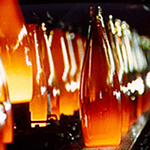 In the glass industry, the continuous supply of pneumatic energy is essential for nonstop glass production, particularly in hollow glass manufacturing. Glass bottles and glass containers are created using compressed air, typically at 3,5 bar(g) and sometimes at 7 bar(g), and vacuum usually at 250 mbar(a). This combination enhances the moulding speed at the IS machines and improves the glass quality, especially with intricate shapes and engravings. Given the 24/7 operational demands in glassworks, the selection of vacuum pumps and air compressors should emphasize their Life Cycle Cost over the years, focusing on high energy efficiency and long-term durability.
In the glass industry, the continuous supply of pneumatic energy is essential for nonstop glass production, particularly in hollow glass manufacturing. Glass bottles and glass containers are created using compressed air, typically at 3,5 bar(g) and sometimes at 7 bar(g), and vacuum usually at 250 mbar(a). This combination enhances the moulding speed at the IS machines and improves the glass quality, especially with intricate shapes and engravings. Given the 24/7 operational demands in glassworks, the selection of vacuum pumps and air compressors should emphasize their Life Cycle Cost over the years, focusing on high energy efficiency and long-term durability.
Pneumofore has been supplying Rotary Vane vacuum pumps and compressors to the glass industry since 1960. In some glass factories, these pneumatic systems have outlasted the entire furnace lifespan, with units operating continuously for over 50 years. This longevity is achieved thanks to Pneumofore’s sturdy system design which includes the Rotary Vane cylinder with non-consumable components and no overhauling needs, the direct coupling with low rotation speed and low temperatures, and the full accessibility for ease of maintenance. These key features ensure Pneumofore’s legendary reliability proven over decades across five continents, even in hot climates and altitudes thanks to customized machines that fit the local glass industry requirements. Long service intervals, a proper system design with filtration devices that prevent swabbing oil from the IS machines, state-of-the-art piping systems and accessories like dryers, receivers and line-filters further contribute to the long-lasting, high-efficiency of these pneumatic systems.
In vacuum applications for the glass industry, Pneumofore’s vacuum pumps replace traditional liquid ring vacuum pumps, halving the electric power consumption and eliminating the cooling water circuit. These vacuum systems, based on the Rotary Vane technology, are particularly beneficial in the manufacturing of glass bottles and glass containers where other technologies like screw vacuum pumps are failing due to high maintenance costs and frequent capacity losses, leading customers back to Pneumofore. With a 10-year warranty on the efficiency of the UV Series vacuum pumps, Pneumofore sets the benchmark in industrial vacuum systems.
When low pressure compressed air at 3,5 bar(g) is required, 2-stage turbo compressors are sometimes used. However, they have limited adaptability to the everchanging needs of glass production. Moreover, the stoppage of a large turbo compressor can be very problematic due to the rare availability of backup units. Therefore, glassworks prefer centralised systems of mid-sized air compressors with few hundred kW. Pneumofore’s Rotary Vane air compressors equipped with Variable Speed drives precisely match the needs of glass bottle moulding at the IS machine. The line-filters used with these lubricated compressor systems purify the compressed air in order to achieve higher purity levels than oil-free compressors.
Hundreds of glassworks worldwide rely on Pneumofore’s vacuum pumps and compressors. Testimonials from satisfied customers consistently highlight the low operational costs, durability and constant efficiency of Pneumofore’s pneumatic systems, making them a trusted choice in the glass industry.
Video Testimonials:
[Wiegand Glaswerk]
[O-I Italy]
[Changyu Glass]
Case Studies:
[A.B. InBev – Grupo Modelo]
[Crown]
[Wiegand Glaswerk]
[Siam Glass]
[Sisecam]
[Sevam]
[Seves]
[Hindustan National Glass]
[MISR Glass]
[Saint Gobain]
[Malaya Glass]
[Middle East Glass]
[Modernization of Eastern Europe Glassworks]
Electronics
Cutting-edge UV pump solutions for high-tech IT production
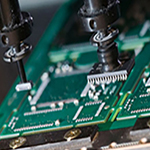 Vacuum pumps play a crucial role in electronics assembly, particularly in precision-driven ‘Pick & Place’ operations. Advanced vacuum systems manage the handling of delicate components and their safe packaging.
Vacuum pumps play a crucial role in electronics assembly, particularly in precision-driven ‘Pick & Place’ operations. Advanced vacuum systems manage the handling of delicate components and their safe packaging.
Traditionally, packaging machines and assembly stations were supplied by ‘on-board’ vacuum pumps, a decentralized option which may disturb the sterile environment of clean rooms and the human concentration with vibrations, contaminants, heat and noise.
Nowadays, the most efficient solution is represented by centralized vacuum systems connected to the assembly network. Sterile production rooms remain undisturbed, while maintenance procedures are strongly optimized. Instead of addressing on-board vacuum pumps individually, centralized vacuum systems undergo regular servicing and avoid production halts caused by unforeseen pump issues. Furthermore, having fewer high-performance vacuum pumps is the key to enhance reliability and energy efficiency.
With a track record of thousands of centralized vacuum systems running non-stop for decades, Pneumofore UV Series vacuum pumps offer high reliability and constant efficiency over the years. Based on Rotary Vane technology, Pneumofore machines eliminate the need of overhauls and are backed with an extended warranty, ensuring trouble-free operation with minimal maintenance requirements. With every UV Series installation, Pneumofore offers system engineering support with precise pipeline calculations in order to reduce any potential losses in pressure or capacity, resulting in further benefits in terms of power consumption, substantial cost savings, and significantly prolonged service intervals.
Case Study:
[Infineon Technologies]
Aviation and Space Industry
Flight test simulations with advanced vacuum systems
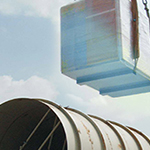 The simulation of high altitude conditions for an airplane or spacecraft flight test requires a vacuum system capable of varying the absolute pressure, often with steep gradients. Unlike many other processes, in the aviation and aerospace industry, a flight test does not need a constant and continuous vacuum.
The simulation of high altitude conditions for an airplane or spacecraft flight test requires a vacuum system capable of varying the absolute pressure, often with steep gradients. Unlike many other processes, in the aviation and aerospace industry, a flight test does not need a constant and continuous vacuum.
Given the large size of an airplane and the consequent extensive space required in flight test facilities, vacuum systems must offer high capacity and pressure variation capabilities. A straightforward power consumption analysis highlights the advantages of Pneumofore’s Rotary Vane UV Series vacuum pumps, which double the energy efficiency compared to liquid ring vacuum pumps. With features like air cooling as standard, a capacity of 3.240 m³/h for each UV50 vacuum pump and the Variable Speed option, the UV Series vacuum pumps represent the state-of-the-art in Rotary Vane technology and the most energy efficient vacuum solutions for the aviation and aerospace industries.
A flight test facility operates only a few hours per month. Therefore, the design simplicity and efficiency of Pneumofore vacuum pumps are ideal for a flight simulation environment. In fact, the installation of these machines is easy, they are Plug & Play vacuum pumps and they do not require foundations. They are also the most appreciated vacuum solution in terms of reduced power consumption and constant efficiency over decades.
Based on these criteria, Pneumofore has been successfully collaborating with world renowned companies and research organizations operating in the aviation and aerospace industry, such as Honeywell, Airbus, and the Fraunhofer Institute. Pneumofore’s advanced vacuum pump solutions ensure precise and efficient flight test simulation at high altitude by varying the pressure conditions while meeting the rigorous standards required in these industries.
By delivering high-capacity, variable-speed and energy efficient vacuum systems, Pneumofore supports the complex flight test needs of the aviation industry. The collaboration with leading aerospace corporations underscores the company’s commitment to advancing aviation and space technology through supplying superior vacuum pump solutions.
Case Study:
[Airbus]
Electric Windings
Achieving perfect and efficient surface coating of wiring using vacuum technology
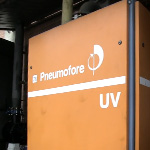
Pneumofore is dedicated to advancing processes for insulating electrical windings and capacitors in medium and high-voltage devices such as motors, transformers, and generators. One of the key technologies in this field is Vacuum Pressure Impregnation (VPI), which ensures perfect electrical insulation for high-voltage applications. This process is essential for both industrial-scale motor production and the fabrication of single, large-size transformers.
VPI offers numerous benefits, including the use of dielectric materials and special resins or oils. The process is cyclic, reaching during each cycle a low vacuum level, which is crucial for achieving a consistent and high-quality surface treatment throughout the year. Such performance is not possible with alternative vacuum solutions such as liquid ring vacuum pumps, as they depend strongly from the cooling water temperature, varying consistently between Summer and Winter.
To optimize productivity, it is important to achieve high pumping speeds and low-pressure levels, especially depending on the reactor size. Pneumofore has established a strong track record in this area and is actively involved in projects aimed at vacuum centralization for multiple autoclaves.
Video Testimonial:
[Vacuum Coating of Electric Motors – Sicme Motori]
Tires
Vacuum pumps play a crucial role in mixing the raw materials, shaping the tires and curing the rubber
 The car industry is going green with electric vehicles. So do the tire manufacturers, under the pressure of environmental requirements. They select high quality vacuum pumps with top reliability and durability, with the lowest power consumption, for minimal emissions, over the long-term. This is how Pneumofore is getting involved more and more.
The car industry is going green with electric vehicles. So do the tire manufacturers, under the pressure of environmental requirements. They select high quality vacuum pumps with top reliability and durability, with the lowest power consumption, for minimal emissions, over the long-term. This is how Pneumofore is getting involved more and more.
The production of tires relies on vacuum technology for several key operations: degassing in the rubber extruder, curing machines and pick & place. These three manufacturing steps are often separate. For optimal tire quality, vacuum application begins at the extruder stage to eliminate moisture, enhancing rubber quality. The pick & place operation using vacuum is straightforward, while the curing process is more complex. Vacuum can be applied to both the bladder and the tire mould. It is used to evacuate the bladder, facilitating the tire extraction from the mould, and is also applied within the mould for better shaping, removing any excess air from the mould, ensuring that the rubber compound is evenly distributed and that the tire takes on the desired shape.
Pneumofore has a long history of supplying vacuum pumps to the tire industry, dating back to 1961 with Michelin. Over the years, Pneumofore has developed skid-mounted solutions for Pirelli’s single lines and installed UV pumps for MRF in India and Nexen in Europe, among others.
See the related Sections:
[Drying / Degassing]
[Pick & Place]
Drying / Degassing
Energy-efficient vacuum solutions for drying humid environments or components across various materials
 Traditionally, drying processes have relied on heat, with techniques evolving from natural sun drying to advanced oven drying over the centuries. However, vacuum drying offers significant advantages by efficiently removing moisture without excessive energy consumption. This method is effective for materials such as wood, metal, pulp and paper, polymers, and more. Degassing with vacuum is applied in extruders for pasta dough, clay for bricks and tiles, and various other materials.
Traditionally, drying processes have relied on heat, with techniques evolving from natural sun drying to advanced oven drying over the centuries. However, vacuum drying offers significant advantages by efficiently removing moisture without excessive energy consumption. This method is effective for materials such as wood, metal, pulp and paper, polymers, and more. Degassing with vacuum is applied in extruders for pasta dough, clay for bricks and tiles, and various other materials.
Vacuum drying must be applied gradually to materials like wood to prevent damage, whereas metals can be dried quickly and efficiently after washing, avoiding the higher energy consumption and potential deformation associated with heat drying. Pneumofore has developed the UV H pumps, where H stands for High temperature of the coolant, above 100°C, ensuring all evacuated water moisture is exhausted from the pump at the discharge.
Large-scale drying processes benefit greatly from vacuum drying, which reduces drying times and energy usage compared to conventional heat drying methods. For instance, metal parts that require drying after washing can be efficiently dried using vacuum technology, as demonstrated in the case study Brakes India.
Polyester chips, resulting from polymerization, need low moisture content for high-quality yarn production. Low dew points, with minimal residual humidity, are achieved using a multi-stage vacuum system. This method ensures effective drying, crucial for their processing, as highlighted in the case study Polyester Chips in India.
In the food industry, vacuum is used in freeze-drying processes to extend the shelf life of fruits and vegetables by removing moisture content. Most Pneumofore installations in this sector are found in the USA.
Degassing applications include Italian pasta production, where vacuum is used in extruders to ensure a homogeneous mixture and prevent water-induced defects or flavor changes. Precise control of vacuum levels and flow rates is essential to maintain product quality. The drying of food is described in more detail in the dedicated Pasta section, with a testimonial video from Pasta Berruto and several case studies.
Food processing with vacuum is also found in tumblers for softening red meat or in evisceration plants. Vacuum cooling is applied in the baking of bread (see the dedicated section). The packaging of food, whether fish, meat, or other perishable items, utilizes vacuum to extract air and humidity, reducing potential deterioration by bacteria due to the absence of oxygen and water. In food packaging, vacuum is also used in bottling liquids like soda drinks or beer [Tuborg Case Study].
Pipeline drying after the dewatering process of new lines typically targets a dew point of -40°C, achieved with a double-stage vacuum system. Special UV H pumps are installed, combined with roots pumps as the second stage, to meet these requirements in the petrochemical industry. See the dedicated Pipeline Drying section in Applications with case studies.
The production of high-quality ceramics with high hardness and fine surface finish is supported by vacuum systems composed of two stages. Large-scale manufacturing of bricks and tiles uses vacuum to eliminate air and water presence at the extruder, allowing better quality of building parts and reducing the energy required by the oven. See the dedicated Ceramics, Bricks and Tiles section.
Vacuum is applied for the evaporation of condensation accumulated during the storage and transportation of lubricants for industrial and automotive use (see the case study of Petronas Lubricants). Another process is Vapor Recovery for ships transporting crude oil and derivatives, which, after unloading, still contain considerable amounts of gas that, by law, cannot be emitted into the atmosphere. Vapor recovery units (VRUs) use Pneumofore vacuum pumps, ATEX certified, to evacuate explosive gases in large capacities.
For materials like leather and aggressive chemicals, vacuum systems need protective measures to prevent contamination. Pneumofore provides innovative vacuum solutions tailored to various industrial drying and degassing needs, ensuring efficient, energy-saving operations across different sectors.
Video Testimonial:
[Fornace Calandra]
[Pasta Berruto]
Case Studies:
[Brakes India]
[Drying of Polyester Chips]
[Vacuum Drying System]
[Vacuum System Renewal in Production Petronas]
[Gazprom]
See the related Sections:
[Pasta]
[Pipeline Drying]
[Food Packaging]
[Ceramics, Bricks & Tiles]
Food Processing
Optimizing food quality and production efficiency with cutting-edge vacuum solutions

The industrialization of food processing increasingly relies on vacuum technology for energy-efficient operations. Pneumofore vacuum pumps are highly effective in removing water vapor, even in challenging environments.
In Ireland, meat processing plants at Kerry Foods and Hilton Foods use Pneumofore vacuum systems in their tumblers to soften meat, benefiting from their reliability and durability. Additionally, there has been a notable growth in the employ of vacuum chambers for baking bread, as well as for storing perishable foods like vegetables and fish.
In France, a quail farm with 25.000 millions quails per year, is running UV H pumps for the evisceration process, replacing former liquid ring pumps. Similarly, also in the USA, a chicken farm has installed UV H pumps.
Many of our customers have experienced significant improvements in production efficiency and product quality with Pneumofore’s centralized vacuum and compressed air units. These systems address the issues caused by small pumps, reducing repair expenses and enhancing the final product’s shelf-life and taste.
For detailed information on the Pneumofore solutions for pasta production and food packaging, please refer to the dedicated sections.
Video Testimonial:
[Pasta Berruto]
Case Study:
[Evisceration in Slaughterhouses]
See the related Sections:
[Pasta]
[Food Packaging]
Pasta
The role of vacuum in the production process
 In the production of dry durum wheat semolina pasta, vacuum is utilized to eliminate and control moisture in the dough before extrusion. The vacuum is created within the kneading machine, where wheat flour and precisely measured water are mixed to form a homogeneous dough. Prior to extrusion, which shapes the pasta into forms such as macaroni and penne, the dough undergoes partial drying through vacuum evaporation until it reaches a predetermined humidity level. The pasta is further dried in dryers down the production line.
In the production of dry durum wheat semolina pasta, vacuum is utilized to eliminate and control moisture in the dough before extrusion. The vacuum is created within the kneading machine, where wheat flour and precisely measured water are mixed to form a homogeneous dough. Prior to extrusion, which shapes the pasta into forms such as macaroni and penne, the dough undergoes partial drying through vacuum evaporation until it reaches a predetermined humidity level. The pasta is further dried in dryers down the production line.
This controlled humidity level facilitates the dough’s passage through the die, effectively eliminating ‘white spots,’ or micro air bubbles, that can compromise the pasta’s texture and its ‘al dente’ feature during cooking. Vacuum technology is used in pasta production for several reasons: improved pasta quality, shorter drying times, a homogeneous dough structure, and a natural colour due to reduced oxidation.
Pneumofore supplies UV H Series vacuum pumps to the pasta industry, primarily in Italy but also internationally. These pumps typically replace liquid ring vacuum pumps, eliminating the need for a cooling water circuit and towers, as well as halving electric power consumption. Special filters protect the pumps and food-grade coolant is used to meet the latest international food industry standards. These features are highly appreciated by pasta manufacturers who frequently return to Pneumofore for expansion projects.
Italian pasta is renowned worldwide for its quality and taste, a reputation strongly supported by the appropriate vacuum systems that Pneumofore has mastered for decades.
Video Testimonial:
[Pasta Berruto]
[Fornace Calandra]
Case Studies:
[Zar Macaron]
[Pezzullo]
[Chirico]
See the related Sections:
[Drying / Degassing]
Food Packaging
Reducing humidity to extend product longevity
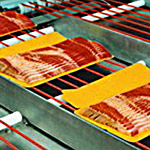 In the food packaging industry, achieving different vacuum levels is crucial, as rough vacuum is combined with fine vacuum for faster packaging speed. Reducing humidity with lower vacuum values is essential. Often, small on-board vacuum pumps are utilized, but as production scales up, centralizing the vacuum system becomes advantageous.
In the food packaging industry, achieving different vacuum levels is crucial, as rough vacuum is combined with fine vacuum for faster packaging speed. Reducing humidity with lower vacuum values is essential. Often, small on-board vacuum pumps are utilized, but as production scales up, centralizing the vacuum system becomes advantageous.
Pneumofore offers a solution for larger production facilities: multi-stage vacuum systems that enhance vacuum levels, extend product shelf-life, and significantly improve the working environment in cold rooms. Unlike multiple on-board pumps that generate noise, oil mist, and underperform, a centralized vacuum system mitigates these issues.
Key benefits of centralized vacuum systems include reduced power consumption and increased packaging speed. UV installations in this context provide reliable operational success throughout the year, ensuring efficiency and productivity 24 hours a day, 365 days a year.
By adopting centralized vacuum systems, the food packaging industry can achieve higher efficiency, better product preservation, and an improved working environment for cold room operators.
Case Study:
[Vacuum for Food Packaging]
Ceramics, Bricks, & Tiles
Eliminating water traces for homogeneous consistency and fine surface
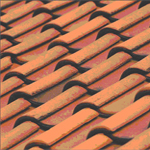
In ceramic, brick, and tile production, it is essential to eliminate water traces in the clay before it enters the oven to ensure a homogeneous consistency and a fine surface finish. This requirement is critical, especially for producing ultra-hard, top-quality ceramics.
Without a dedicated filtration system, solid silicate and clay particles in the vacuum pump’s suction can cause slow erosion of all materials. Pneumofore has the expertise to set-up dedicated filtering system and avoid any contamination of the vacuum pumps. The degassing process is continuous at a specific vacuum level and the UV pumps have been proven effective and durable in several plants.
Pneumofore offers fully engineered vacuum solutions with air-cooling, providing significant advantages over traditional systems, mostly based on liquid ring technology. Our solutions require less power, produce less noise, and eliminate the need for continuous repair. This results in more efficient and reliable operations, ensuring the consistent quality of ceramics, bricks, and tiles.
For manufacturers seeking superior performance and lower operational costs, Pneumofore’s vacuum technology is the optimal choice. See below case studies and the testimonial video of Fornace Calandra in Italy.
Video Testimonial:
[Fornace Calandra]
Case Studies:
[Vacuum use for Degassing of Bricks and Tiles]
[Marble Tiles Production]
See the related Sections:
[Drying / Degassing]
Pipeline Drying
Drying with vacuum is faster and more economical with advanced pump technology
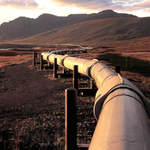
Pipeline systems, which often extend thousands of kilometers and vary in diameter, present challenges in cleaning and drying processes. Before gas can flow through these systems, they must be entirely free of contaminants and moisture. Leak testing is a standard step in pipeline preparation, typically performed with pressurized water. However, the choice of drying technique plays a critical role in ensuring efficiency and reliability. Operators often rely on established methods, hesitating to explore new technologies despite potential improvements in cost and performance. The drying system chosen must meet essential criteria, such as speed, simplicity, mobility, efficiency, low investment and long-term durability. In the following comes a brief comparison of the most popular pipeline drying techniques: hyper-dry air, nitrogen and vacuum.
The use of hyper-dry air for pipeline drying involves large oil-free air compressors paired with chillers to achieve a dew point of – 40°C. While this method can be effective, it has significant drawbacks. The process requires a substantial amount of energy, with compressors wasting approximately 80% of their input as heat. Moreover, the setup is complex, involving multiple pieces of equipment that demand careful synchronization to ensure proper function. Despite these efforts, residual moisture may remain in hidden areas, creating potential contamination risks. The overall energy balance of this method is costly and its reliance on energy-intensive equipment often limits its practicality.
Nitrogen drying is another option, valued for its inert properties and suitability for hazardous environments, such as refineries. Its ability to absorb water vapor makes it useful in certain cases, but the challenges are significant. Nitrogen requires compressors to overcome pipeline resistance, and its availability on-site can be both difficult and expensive. Like compressed air, nitrogen eventually dissipates into the atmosphere, adding to operational inefficiencies.
Vacuum drying, by contrast, offers a highly efficient and cost-effective alternative. This method relies on creating a vacuum within the pipeline, allowing water to evaporate at low pressure and subsequently removing it as vapor. Vacuum drying systems require far less energy than air compressors and are generally more mobile and compact, making them suitable for deployment in remote or challenging locations. The drying process is faster, and the risk of residual moisture is significantly reduced, ensuring the pipeline is fully prepared for operation. Key to the success of vacuum drying is the use of advanced vacuum pumps capable of handling high water vapor loads without compromising their performance. Multi-stage systems are particularly effective, combining rough vacuum pumps with second-stage rotary piston or roots pumps to achieve high flow rates and deep vacuums. Pumps designed for this purpose operate at high temperatures, enabling them to handle water vapor efficiently while maintaining durability. Air-cooled options are especially advantageous in hot or tropical climates.
Despite its advantages, the vacuum drying market has seen mixed results due to the variable quality of equipment offered by different manufacturers. Poorly designed systems have led to inconsistent performance, undermining trust in the technology. However, when executed with well-engineered solutions, vacuum drying has demonstrated its ability to deliver reliable and efficient results, even under demanding conditions.
In pipeline operations, where thorough drying is essential, vacuum drying has proven to be the most effective method, offering significant benefits in terms of speed, efficiency and reliability. By overcoming the limitations of traditional techniques, it provides a robust solution for onshore, offshore, and refinery applications, ensuring pipelines are prepared for safe and efficient operation. Pneumofore proves with facts and case studies, over decades of operation, with notable companies active in this field, supported by pictures and testimonials, continuous success and shortest, most efficient drying of pipelines.
Case Studies:
[Narmada Offshore]
[BJ Services]
[Gazprom]
See the related Sections:
[Drying / Degassing]
Pick & Place
Ensuring contamination-free movement and packaging with centralized vacuum systems
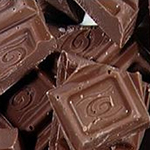
Ferrero, the renowned Italian chocolate producer with plants in Italy, Belgium, and Argentina, selected Pneumofore to provide vacuum solutions for various applications, including drying, transportation, and Pick & Place during the box packaging phase. By implementing a centralized vacuum system, Ferrero achieved higher production speeds with several UV vacuum pumps supplying a continuous 24/7 vacuum.
The Pick & Place process is essential in numerous industries, especially where serial production demands automated and rapid movement of products or packaging. This technology is prevalent in food, medical, container, and electronics production sites. For instance, our machines installed at Becton Dickinson in the UK facilitate the Pick & Place process within a medical factory, while the UV pumps at Seagate in Asia are used for moving tiny screws during hard disk assembly.
Pneumofore’s centralized vacuum systems ensure contamination-free handling in clean rooms, speeding up crucial and precise production steps. Our commitment to delivering reliable and efficient vacuum solutions helps various industries enhance productivity and maintain high standards of quality and hygiene.
See the related Sections:
[Drying / Degassing]
[Pneumatic Conveying]
[Food Processing]
[Food Packaging]
[Pharma / Medical]
[Electronics]
Pharma / Medical
Applications from medicine production to pick & place and packaging processes
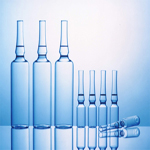 The pharmaceutical industry relies on vacuum technology for various critical processes, from medicine production to the final stages of packaging. Vacuum systems, characterized by the absence of air, are essential for maintaining clean conditions and preventing contamination by volatile impurities.
The pharmaceutical industry relies on vacuum technology for various critical processes, from medicine production to the final stages of packaging. Vacuum systems, characterized by the absence of air, are essential for maintaining clean conditions and preventing contamination by volatile impurities.
Access to the production area of Pharmaceutical Industries is limited, we rarely know about improvements regarding constant vacuum level or lower absolute residual pressure, which might speed up or simplify specific steps.
When we replace liquid ring or screw pumps with our rotary vane technology, we base our installations on Return on Investment calculations. This ensures alignment with the industry’s strict standards for precision and reliability. Pneumofore UV pumps are highly valued due to their clean exhaust and low noise level, as evidenced by their successful implementation at Becton Dickinson in Ireland, where they replaced rotary screw pumps.
In Belarus, the combination of air-cooling and significantly reduced power consumption of UV pumps, along with our vacuum system engineering expertise, led to substantial savings compared to the previous liquid ring system. Similarly, Lifescan in Scotland transitioned from costly repairs and maintenance of ‘compact vane pumps’ to a Pneumofore system, benefiting from industrial-grade durability and easier maintenance.
Our UV pumps not only meet the demanding requirements of the pharmaceutical industry but also provide efficient, cost-effective, and reliable solutions that enhance overall production processes.
Case Studies:
[Borisovmed in Belarus]
[Central Medical Vacuum]
See the related Sections:
[Food Packaging]
[Pick & Place]
Pneumatic Conveying
Moving materials with compressed air or vacuum in conveying systems
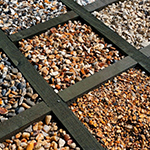
Pneumatic conveying is an efficient and versatile method used for transporting bulk materials through a pipeline using air. The size and weight of the grains sometimes require a higher vacuum level than what Side Channel Blowers can achieve. Maintaining the exact vacuum is crucial for accurate dosing, particularly in industries where precision and uniformity are critical.
A wide range of materials can be moved using pneumatic conveying, each with unique characteristics that must be considered to ensure optimal system design and operation. For example, cement differs significantly from polymer granulate or cereals in terms of specific weight, fragility, and hardness. These differences necessitate careful calculation of pipe sizes and materials to accommodate the unique requirements of each material.
When transporting materials with vacuum rather than pressure, there is an inherent risk of contaminating the vacuum pumps with the conveyed material. This potential contamination can compromise the efficiency and longevity of the pumps. Therefore, it is essential to implement tailored filtration systems to protect the pumps. These filtration systems are designed to capture and remove any particulates or contaminants from the material stream before they can enter the pump, ensuring the system remains clean and operates effectively.
Additionally, pneumatic conveying systems must be designed to handle the specific challenges posed by different materials. For example, fragile materials require gentle handling to prevent damage, while abrasive materials need robust pipelines and components to withstand wear. The system design also includes considerations for maintaining the integrity of the conveyed material, preventing segregation, and minimizing degradation.
In conclusion, pneumatic conveying is a highly adaptable solution for transporting a variety of materials. However, it requires careful planning and design to address the unique properties of each material and to protect the conveying equipment. With the right approach, pneumatic conveying systems can offer reliable and efficient material handling for a wide range of applications.
Bottling
Innovative vacuum systems for liquid bottling
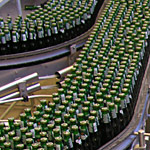 In the food processing industry, maintaining strict hygiene and production standards is essential. New regulations requiring total bacterial contamination control can pose significant challenges, particularly for beer bottling plants that often use liquid ring vacuum pumps.
In the food processing industry, maintaining strict hygiene and production standards is essential. New regulations requiring total bacterial contamination control can pose significant challenges, particularly for beer bottling plants that often use liquid ring vacuum pumps.
Pneumofore’s customized vacuum systems are specifically designed to overcome these obstacles. Our UV H vacuum pumps enhance productivity in beer bottling by eliminating the need for cooling water and cooling towers, which are necessary for liquid ring vacuum pumps. This innovation ensures cleaner processes and reduces the risk of bacterial growth, which often occurs in cooling towers. Such improvements are particularly important since the bottling process exposes vacuum pumps to bioactive liquids like beer or soda drinks containing sugar.
Pneumofore’s vacuum systems are not only efficient but also environmentally friendly, utilizing 100% air cooling to eliminate the risk of viral contamination in water cooling towers. The UV H pumps operate at 110°C, effectively eradicating any bacteria. This unique approach ensures compliance with stringent food production regulations while introducing high operational efficiency. The absorbed electric power of rotary vane UV H pumps, running at high temperatures, is half that of liquid ring pumps. The air-cooling system further supports the latest environmental sustainability criteria.
Our technology has been highly appreciated, earning Pneumofore a nomination for the ‘Danish Engineers Products Prize 2005’ due to its ability to halve the installed power and eliminate cooling water problems at a Danish brewery.
By utilizing Pneumofore’s advanced vacuum solutions, beer bottling plants can achieve higher productivity, comply with stringent regulations, eliminate the risk of bacterial contamination in the bottling process, and reduce operational costs.
Case Study:
[Tuborg]
Hydrocarbons
Atex certified compression and evacuation solutions for durable performance
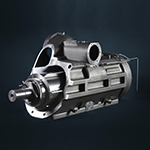
Rotary vane technology is extensively used in the compression and evacuation of explosive gases. Pneumofore specializes in high-capacity machines designed for hazardous areas classified as Atex Zone 2. A lubrication film covering all internal surfaces, including the rotating element and the vanes, ensures effective isolation from direct contact with the gas.
Pneumofore’s first Vacuum Air-End supplies for Vapour Recovery Units (VRUs) date back 20 years, in collaboration with Cool Sorption from Denmark. Numerous UV50 Air Ends, in their special Atex-certified versions, are installed worldwide for VRU operations. Deliveries have also been made to Aker Solutions, VOCZero, and Zeeco for the purpose of recovering volatile explosive gases from ships after unloading fuel of various compositions.
On the compression side, Pneumofore primarily provides bare-shaft KC rotary vane gas compressors for integration into gas compressor systems. Our customers, known as ‘packagers,’ select the appropriate compressor size from our wide range, starting with the KC10 for 46 m³/h and extending to the KC400 for 2.560 m³/h. Selection is based on the specific capacity and pressure of a particular hydrocarbon gas composition to meet complete system performance demands. These KC bare-shaft compressors are Atex certified II 3/3G. Capacities are declared for air, with a standard reference atmosphere conforming to ISO 8778 and performance according to ISO 1217.
Our customer, Enerproject from Switzerland, has also ordered compressors made of GJS 500/7 or GJS 400/18 LT housing casting to meet stringent naval safety criteria for installation on boats. Other KC compressors have been delivered to Wartsila, a company specializing in power generation with engine power plant solutions.
All biogas compressors are also part of Pneumofore’s hydrocarbons compressor systems. The complete gas compressor system, known as the K-Series, is now predominantly used for biogas compression. Please see the dedicated Biogas application section for more information.
See the related Sections:
[Biogas]
Biogas
Innovative biogas compression solutions for efficient renewable energy
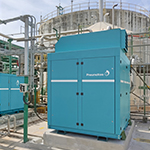 Biogas is produced when organic matter undergoes anaerobic digestion in the absence of oxygen. This process results in a renewable energy source commonly used for electricity production. To optimize the efficiency of biogas utilization, compressors are employed to move the gas and ensure it is at the necessary pressure levels for various applications.
Biogas is produced when organic matter undergoes anaerobic digestion in the absence of oxygen. This process results in a renewable energy source commonly used for electricity production. To optimize the efficiency of biogas utilization, compressors are employed to move the gas and ensure it is at the necessary pressure levels for various applications.
Pneumofore specializes in manufacturing rotary vane biogas compressors tailored for different pressure requirements. Each installation is customized to accommodate varying local circumstances, including the gas composition, inlet pressure, and desired outlet pressure. Our extensive experience has allowed us to stay ahead of industry demands, offering solutions such as booster compressors capable of increasing line pressures from 8 bar(g) to 14 bar(g). Most biogas plants feature installed power capacities ranging from 30 to 200 kW, and our compressors often operate outdoors without additional protection.
For instance, our K180.4 biogas compressors are installed near the sea in Rayong, Thailand, at a large plant operated by the Petroleum Authority of Thailand (PTT). These units, which operate at a low pressure of 2,5 bar(g), compress gas derivatives from marine plants. Given the corrosive marine environment, the compressor cabins are specially painted to resist humidity and salt exposure.
In Germany, Pneumofore has equipped Movingreen energy plants with compressors designed to achieve pressures of 10 bar(g). Meanwhile, in the UK, Vulcan Renewables utilizes an outdoor installation to withstand the rainy climate. In Italy, our booster compressors, particularly the K2.60 model, are widely used. Four units were installed at 2LNG to elevate biogas pressures from 7 bar(g) to 14 bar(g). These machines are highly customized and involve significant engineering costs, representing unique sales proposals. Notably, 2LNG approached seven different compressor manufacturers before choosing Pneumofore to develop these innovative machines collaboratively.
Biogas is a natural and relatively accessible resource, providing a clean solution for electricity generation. It plays a crucial role in the sustainable energy landscape, and Pneumofore is committed to advancing biogas technology through our specialized and customizable compressor solutions.
